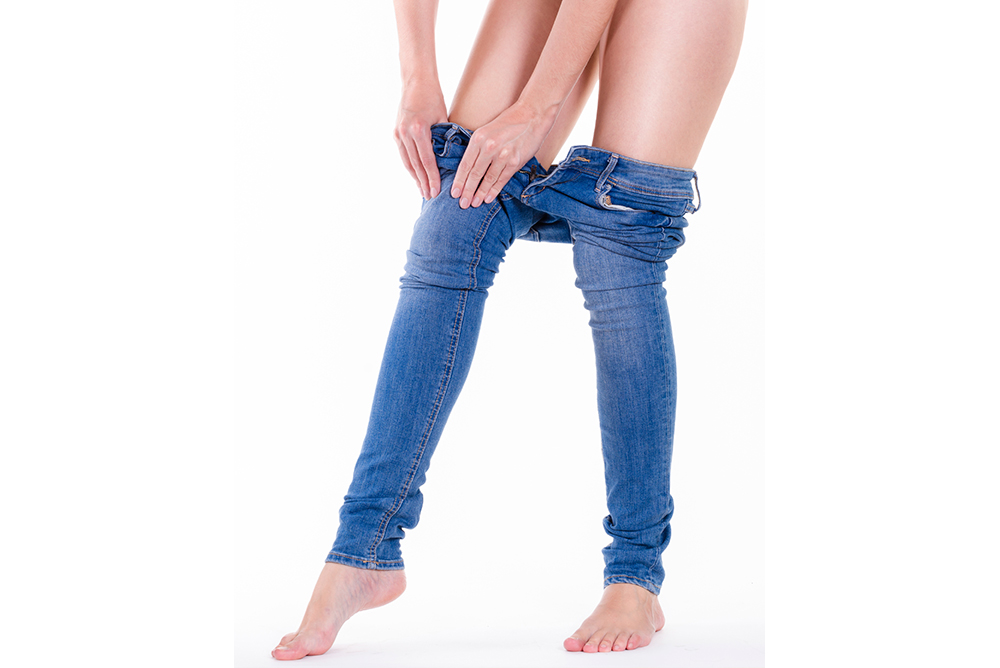
iStock
When we posted this story in May 2016, skinny jeans were at the height of their popularity. This fall, boot-cuts and wide-leg jeans have come back into favor. But shapewear that is worn to make the body conform to a fashionable ideal is as in demand as ever. For more on the subject of underwear, be sure to read this Wednesday’s post about an exhibit on underwear.
IF YOU’RE HAPPY with your skinny jeans and Spanx, go for it! But if you’re looking for excuses to scale back on such constricting fashions, associated health issues abound.
Many people suffer from “tight pants syndrome”—abdominal discomfort, heartburn and belching, as Chicago’s Rush University Dr. John Michael Li told CBS Miami. He said pants are often three inches too small for the person’s waist. Pressure on the abdomen interferes with digestion. Tight clothes have also been blamed for blood clots as well as bladder and vaginal infections.
“Skinny jeans are meant to accentuate the way you look, not to make yourself look another way,” New York-Presbyterian Hospital/Columbia University vascular surgeon Nicholas Morrissey told HealthPop. “Clothing isn’t designed to give us a shape that we don’t have.”
For a 35-year-old British woman, tight pants caused her legs to swell until she collapsed at the side of the road and later at the hospital needed her pants cut off to release her legs. After squatting a lot during the day to help a family member move, she noticed numbness in her feet and then had trouble lifting them to walk. The diagnosis: extremely dangerous “compartment syndrome,” the result of increased pressure in a confined body space usually caused when limbs are crushed in massive construction accidents or during earthquakes.
As for “low-rise” pants, they can compress nerves in the hips, causing burning, tingling and numbness in the legs due to a condition called meralgia paresthetica, a nerve disorder like carpal tunnel syndrome. A teenager who wore shapewear under her soccer uniform until she felt numbness in her thigh and persistent abdominal pain was diagnosed with nerve damage caused by meralgia paresthetica.
The cause: pressure on the nerve that supplies sensation to the upper thighs. Meralgia paresthetica symptoms often occur on only one side of the body and can also be caused by nerve damage due to diabetes or seat belt injuries. Tight pants can also limit mobility of the hip joints, putting strain on the joint capsules and on the spine.
While reluctant to “Spanx-shame anyone,” Elizabeth Enochs on Bustle quotes physicians saying shapewear can cause nerve impingement and decreased circulation. And high-waisted shapewear that cover your whole abdomen can affect digestion and lead to bloating, gas and acid reflux.
Any synthetic material worn next to the skin, especially when it’s tight, can irritate the “lady bits,” according to Bustle. Wearing yoga pants all day—as well as tight underwear—can raise the risk of yeast and bacterial infections, caused when heat and moisture from your body as well as sweat remain trapped in the material and create good conditions for these to grow. Urinary tract infections, which can affect any part of the urinary tract, result when bacteria multiply in the urine and move into the bladder or kidney. Cystitis, a common UTI, inflames the bladder in response to chronic pressure or when yeast or fecal bacteria travel up the urethra.
“Super-tight jeans can push the fabric of your underwear all the way up into your crack, which transfers fecal bacteria from your butt toward your urethra and vagina,” Ob/Gyn professor Rebecca Amaru at Mount Sinai Hospital in New York City told Cosmopolitan. “The rubbing itself could cause inflammation and break the skin, which makes it even easier for bacteria to get into your system.”
Cosmo suggests alternating between skinny jeans and looser-fitting bottoms—to “give your immune system a chance to clear out any bacteria that gets into your urinary tract during skinny jean days”—and warns that bacterial UTIs can be cured only with antibiotics, so see a physician ASAP.
Some women are genetically predisposed to UTIs while, for others, a series of infections can lead to chronic, repeating UTIs. An aggregated review of studies on cranberry juice concluded that it did not significantly reduce the incidence of UTIs.
While these may seem like extreme cases, wearing tight clothing is related less to health and more to fashion because what is compressed in one area will try to pop out somewhere else. So, when you’ve nailed the fitted look, it’s wise to change into something looser when you can.
—Mary Carpenter
Read more of Mary’s posts here.
